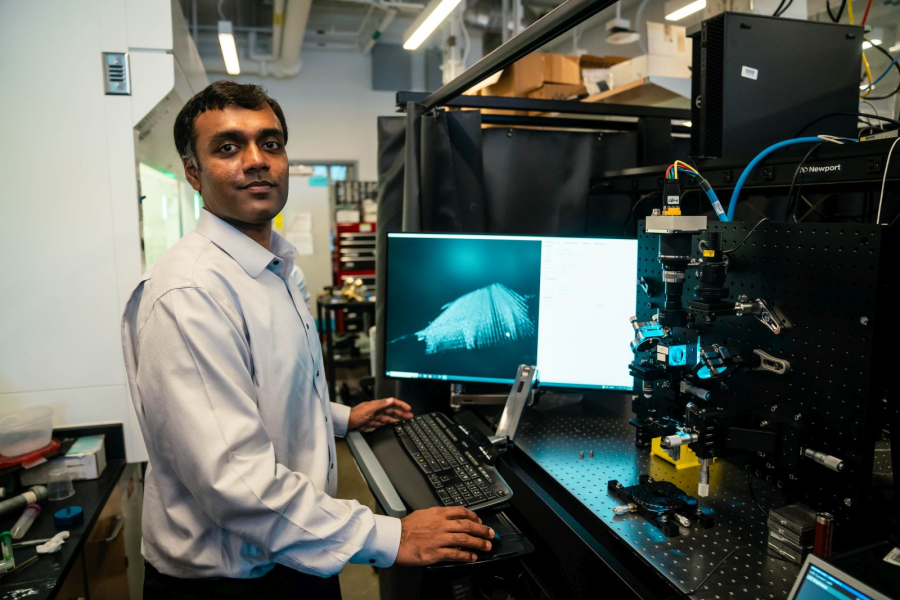A researcher at the Cullen College of Engineering has received a renewable grant with a total potential value of about $3.2 million from the National Institutes of Health to expand his research into improving the accuracy of diagnosis for forms of kidney disease.
Rohith Reddy is an assistant professor in the Electrical and Computer Engineering Department, and a Cancer Prevention and Research Institute of Texas (CPRIT) Scholar in Cancer Research. The NIH's National Institute of Diabetes and Digestive and Kidney Diseases chose his proposal, "Improving the Accuracy of Lupus Nephritis Diagnosis using Biomarkers Derived from Ultraviolet and Mid-infrared Spectroscopic Imaging," for funding.
The grant is $629,842 for its first year. If the research shows promise, it is renewable for up to five years, for a total value of about $3.2 million.
Reddy explained that his research's goal is to improve the accuracy of the diagnosis of lupus nephritis, which is a kidney disease where the immune system of the body attacks parts of its own kidney.
"The current problem is that the accuracy of diagnosis is quite poor," he said, noting that in some cases, diagnosis accuracy is as low as 50 percent.
"To improve the diagnosis, we need a more objective standard and methods. We are introducing two new technologies and combining information intelligently. One technology is based on ultraviolet light, and the other on infrared light, utilizing both shortwave and long wavelengths. By integrating information from both, we aim to enhance the diagnostic process."
According to Reddy, the idea for the research came out of prior work to improve the accuracy of gynecologic ovarian cancer diagnoses. He also noted that his proposal was refined thanks to collaboration with his Cullen peers David Mayerich — an associate professor in the Electrical and Computer Engineering Department, and another CPRIT Scholar — and Chandra Mohan, Hugh Roy and Lillie Cranz Cullen Endowed Professor of Biomedical Engineering.
Reddy also identified two others with outside affiliations that would be involved in the project — Kyung Hyun Lee, an assistant professor of Biostatistics at UT Health's Center for Clinical Research and Evidence-Based Medicine; and Anthony Chang, a Professor of Pathology at the University of Chicago.
He added that his past and future research wouldn't be possible without the hard work of the students he oversees.
"As an assistant professor, like any professor at any level, you rely on your students and postdocs to do a lot of the work because one person can only do so much," he said. "They are the ones performing many of the experiments and handling hands-on tasks. I'm very thankful to have good students."
Reddy said he was "ecstatic" to receive the NIH funding. He noted that it wouldn't have been possible without the earlier $2 million in funding he received from CPRIT to establish his laboratory when he first joined Cullen as a postdoctoral researcher from Harvard Medical School. There, he worked directly on patient-centric devices, which had a strong influence on his research goals.
"I have always been fascinated by biomedical engineering, and my Ph.D. was in bioengineering," he said. "Although I'm an engineer, I have a deep interest in the medical field. This interest motivated me to pursue my postdoctoral fellowship at Harvard Medical School. I worked on devices that were used immediately in a hospital setting at Massachusetts General Hospital."
"We made imaging devices and took them to the hospital for direct patient studies. That kind of work keeps me motivated because I know our efforts will impact human happiness and patient health. It may not be instantaneous because it's research and will take some time to reach the hospital. However, I'm confident that the research we're doing will ultimately save lives in the future, and that is what truly keeps me motivated."

![Rohith Reddy [second from left] poses with the researchers in his lab. Rohith Reddy [second from left] poses with the researchers in his lab.](/sites/ccoe.egr.uh.edu/files/images/news/2024/reddy-lab-wide-01.jpg)